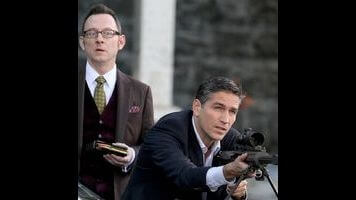Person Of Interest: “Brotherhood”

“Brotherhood” is an interesting episode in that it highlights Person of Interest’s strengths and weaknesses. Like the series’ best episodes, this one explores its favorite themes, such as corruption, trust, purpose, and the complex relationship between good and evil. The episode studies the cycle of violence through parallel tales of a foster child and an adult gang member. Good and evil are practically fighting for Malcolm’s soul as circumstances and temptations have been tugging him back and forth ever since he was a child. Young Malcolm thought he was doing good when he bought a gun to protect his family from the violence taking place outside their door, but his efforts weren’t exactly rewarded, as his mother went to jail in his place, for the crime of owning an unregistered weapon. After he and his sister, Tracy, are placed in separated foster care homes, Malcolm commits a crime in order to reunite his family; he steals drug money to pay for an attorney capable of freeing their mother. Unfortunately, the drug money belongs to a gang called the Brotherhood, which accepts Malcolm’s offer to sell himself into criminality in exchange for his sister’s freedom. Reese rescues him in the nick of time, and tries to point the family in the right direction by uniting the siblings and providing them with legal counsel for their mother. In the end, though, good doesn’t triumph over evil; the Brotherhood is impressed by Malcolm’s tenacity and plans to do everything in its power to bring him to the Dark Side, where he will be sucked into a life of crime.
In almost every instance, good intentions result in dire consequences. Malcolm’s decision making often reverts to illegal acts since they’re easy, convenient, and familiar to him. These tactics backfire again and again; like Reese says, “You can’t make something right by doing something wrong.” A crime-infested world is a difficult one to escape, as it permeates a person’s being, and children are especially vulnerable. One stroke of luck can affect the tug of war between good and evil; a Fusco can meet a Reese and his world can be turned upside down. Unfortunately, these happy circumstances can’t often compete with the edge that evil has over good. Evil spreads like wildfire because it preys on the vulnerable, its ruthlessness being infinite because due to a lethal blend of ambition and apathy.
Watching the cycle of violence play out isn’t just enlightening because of the way that it reflects certain truths about society. There are enough similarities between Malcolm and Dominic to surmise that they might share similar backgrounds and fates. As leader of the Brotherhood, Dominic is ensuring that the cycle of violence in which he finds himself is repeated through future pawns like Malcolm. Dominic is Malcolm’s future, unless the cycle is interrupted. This is a depressing conclusion for the case of the week, but now the true nature of a Season Four Big Bad has been revealed. The leader of the Brotherhood probably started out as an idealistic, determined child just like Malcolm. Years of withstanding the war between good and evil may have eventually exhausted and hardened him, turning Malcolm into the nihilistic criminal leader we know and love.
Person of Interest handles its villains well, and Dominic is no different. Instead of being a gangster on the low end of the totem pole, one disposable enough to leave behind, Mini turns out to be Dominic himself. The head of this criminal organization doesn’t mind being abandoned by his “brothers,” since the money is all that matters. This is a very promising introduction for Dominic; the episode’s examination of his lack of scruples makes him terrifying and his electric interrogation scene with Shaw indicates that his role this season will be one to watch. The team is strengthened by its purpose, while Dominic is empowered by his numbness. It’s appropriate that Dominic’s introduction takes place in an episode where the team’s relationship with Elias is deepening. Finch is divulging more and more to a criminal mastermind, a progression illustrated by the scene on the underground subway, a location that’s underground and reminiscent of the team’s lair for a reason. Both villains initially concealed their true identities from the team, causing concern as to whether Elias has actually broken his cycle of criminal intentions or not; insight into one criminal’s head space is a reminder that likable Elias could easily be playing Finch for a fool again. Either way, this episode illustrates what a difference it makes when a story involving superhero-like characters pays an equal amount of attention to its villains. In a way, “Brotherhood” is a villain origin story. Take note, Marvel.
While this episode does a good job with its characters and themes, the execution is lacking. Malcolm’s story is incredibly rich, but it’s presented in an overly saccharine way. A plot involving wayward moppets, foster care, and drug money stolen for the good of family is easily weighed down by cheese. If transcendent child actors aren’t available, the tone has to be tweaked in a way that can elevate this type of material; playing it straight is not going to cut it. All too often, Person of Interest’s writers also save the majority of their quality material for the end of episodes. Twists and thematic conclusions are great for leaving audiences wanting more, but there won’t be an audience to impress if viewers have already bailed due to weak first and second acts. It was wise to keep Dominic’s scenes to a minimum to preserve the surprise at the end, but it’s a problem when his were the only ones that truly sung. A problem with this episode wasn’t that there was too little, but that it got there too late.
Stray observations:
• I’m leaving the stray observations up to you guys this week. I was actually able to transcribe one quotation, so my job here is done. Go nuts.